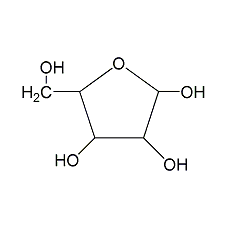D(-)-Ribose D(-)-Ribose

Structural formula
| Business number | 0141 |
|---|---|
| Molecular formula | C5H10O5 |
| Molecular weight | 150.13 |
| label |
D-crisp ribose, Heterosexual gummy candy, D(-)-Ribose, FEMA 3793, D-(-)-Ribose, α-D-Ribofuranose, Ribose, D-Ribose, Biochemical reagents, sweeteners and condiments |
Numbering system
CAS number:50-69-1
MDL number:MFCD00135453
EINECS number:200-059-4
RTECS number:VJ2275000
BRN number:1723081
PubChem number:24901881
Physical property data
1. Properties: white crystal or crystalline powder, slightly aromatic. 2. Density (g/mL, 25/4℃): Undetermined
3. Relative vapor density (g/mL, air=1): Undetermined
4. Melting point (ºC): 955. Crystal Phase standard combustion heat (enthalpy) (kJ·mol-1): -2345.66. Crystal phase standard claim heat (enthalpy) (kJ·mol-1): – 1051.17. Refractive index: -21 ° (C=1, H2O)
8. Flash point (ºC): Undetermined
9. Specific rotation (º): -20.8 º (c= 4, H2O)
10. Autoignition point or ignition temperature (ºC): Undetermined
11. Vapor pressure (kPa, 25 ºC): Undetermined
12. Saturated vapor pressure (kPa, 60 ºC): Undetermined
13. Heat of combustion (KJ/mol): Undetermined
14. Critical temperature (ºC): Undetermined
15. Critical pressure (KPa): Undetermined
16. Log value of oil-water (octanol/water) partition coefficient: Undetermined
17. Explosion upper limit (%, V/V): Undetermined
18. Explosion lower limit (%, V/V): Undetermined
19. Solubility: can be dissolved in Water and methanol easily absorb moisture, tend to be supersaturated in water, and are slightly soluble in ethanol.
Toxicological data
1. Reproductive toxicity: Intrauterine TDLo of female mice: 5045ug/kg, conception occurs two days later; 2. Mutagenicity: DNA inhibition detection system: human lymphocytes: 50mmol/L; mutation testing system – not other specifiedTEST systems: Human lymphocytes: 30mmol/L
Ecological data
None
Molecular structure data
1. Molar refractive index: 31.05
2. Molar volume (cm3/mol): 89.2
3. Isotonic specific volume (90.2K): 266.0
4. Surface tension (dyne/cm): 78.7
5. Polarizability ( 10-24cm3): 12.31
Compute chemical data
1. Reference value for hydrophobic parameter calculation (XlogP): None
2. Number of hydrogen bond donors: 4
3. Number of hydrogen bond acceptors: 5
4. Number of rotatable chemical bonds: 4
5. Number of tautomers: 5
6. Topological molecule polar surface area 98
7. Number of heavy atoms: 10
8. Surface charge: 0
9. Complexity: 104
10. Number of isotope atoms: 0
11. Determine the number of atomic stereocenters: 3
12. Uncertain number of atomic stereocenters: 0
13. Determine the number of chemical bond stereocenters: 0
14. Number of uncertain chemical bond stereocenters: 0
15. Number of covalent bond units: 1
Properties and stability
None
Storage method
Store in a cool place after airtight packaging.
Synthesis method
Use D-glucose as raw material, add bacteria or Bacillus subtilis for fermentation, and separate and refine the fermentation products.
Preservation of bacterial strains → Activated slope → Seed tank culture → Fermentation → Fermentation broth →
Flocculation → Supernatant → Cationic resin exchange → Activated carbon decolorization → Concentration
→Refined→Crystallized→Product
Purpose
D-ribose plays an important role in the pharmaceutical industry, food industry, agriculture and life science research. In the pharmaceutical industry, it is a very useful biochemical reagent, pharmaceutical and pharmaceutical synthesis intermediate. In the food industry, it can be used as a sweetener and condiment, as well as a crop growth promoter and feed additive.
